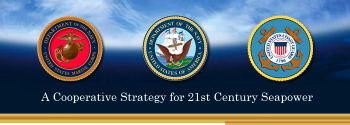A Cooperative Strategy for 21st Century Seapower Strategy | Video

I'm just back from the 2008 Current Strategy Forum at the US Naval War College in Newport. This year the topic of panels and presentations (including addresses and extensive Q&A by the Secretary of the Navy, Chief of Naval Operations and, the Commandant of the Marine Corp) was the Cooperative Strategy for 21s Century Seapower - a joint strategy for the US Marine Corp, Navy and Coast Guard. The strategy raises prevention of war - deterrence, cooperative relationships with more international partners, trust built through humanitarian assistance and disaster response - to an equal level as the conduct of war. In the very best sense this is a positioning statement: what a nation should expect from its maritime forces.
I think it's a deep and intellectually honest reflection on specific value that maritime forces can deliver in a time of uncertain conditions and rapid change. A Navy Commander who lead the team responsible for developing the strategy wrote (anonymously):
... the Naval War College and my staff began conducting the “Conversations with the Country”. We were eventually to conduct seven, in Newport, Phoenix, Atlanta, San Francisco, Seattle, New York and Chicago. I was a huge skeptic of these forums from the start; by the end, I saw some value in them. We relied upon several methods of creating the invitation list for these events. We started with the Naval War College Foundation mailing list—but then worked with state humanities councils, civic groups and academic groups to try and get a broad cross-section of Americans. Did we succeed? Not entirely. We got a lot of old, white guys who had military backgrounds. But we also got a lot of teachers, first responders, friends of folks in the military—just plain citizens who were just plain pleased to be asked their opinion. And that’s what we mainly did—while we jiggered with the formula over the course of the Conversations, we never wavered from the central proposition that we were there to listen.
What we learned is what we say in the strategy. They want us to remain strong, they want us to protect them here in their homeland, and they want us to work with other nations around the world to preserve peace. Sounds pretty boilerplate, right. Think again. I’ve spent a goodly part of the past 21 years working the edges of the empire; I just naturally assumed that the American public knew what we were doing out there and that they had some appreciation for why we do it. I was shocked at how wrong I was…my strongest take-away from the early conversations was that Homeland Defense and National Defense were the exact same thing to most of the people in the audience. They were concerned with porous borders, port security, and terrorists on airplanes. I did not discern a great deal of understanding as to why we were forward deployed around the world. There was only a vague sense of the importance of the Navy. - Maritime Strategy 2007: The Team Leader Speaks
I think the strategy is clearly stated, well crafted and appropriate for public review and discussion. Most importantly, I believe it can raise the level of discourse on the role of the military above purely partisan positioning. The video (below) is pretty good too!
Never before have the maritime forces of the United States—the Navy, Marine Corps, and Coast Guard—come together to create a unified maritime strategy. This strategy stresses an approach that integrates seapower with other elements of national power, as well as those of our friends and allies. It describes how seapower will be applied around the world to protect our way of life, as we join with other like-minded nations to protect and sustain the global, inter-connected system through which we prosper. Our commitment to protecting the homeland and winning our Nation’s wars is matched by a corresponding commitment to preventing war.
Our citizens were involved in development of this strategy through a series of public forums known as the “Conversations with the Country.” Three themes dominated these discussions: our people want us to remain strong; they want us to protect them and our homeland, and they want us to work with partners around the world to prevent war. These themes, coupled with rigorous academic research, analysis and debate, led to a comprehensive strategy designed to meet the expectations and needs of the American people.
A Cooperative Strategy for 21st Century Seapower binds our services more closely together than they have ever been before to advance the prosperity and security of our Nation. The demands of an uncertain world and the enduring interests of the American people require nothing less.
from A Cooperative Strategy for 21st Centry Seapower (.pdf)
 I18N ERROR: @tsiskin#footer_RSS_Feed
I18N ERROR: @tsiskin#footer_RSS_Feed